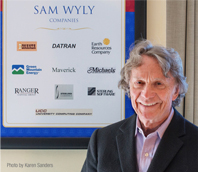© 2016 The Texas Lawbook.
By Mark Curriden
(July 27) – A federal bankruptcy judge on Monday ordered Dallas entrepreneur and philanthropist Sam Wyly to pay the Internal Revenue Service $1.1 billion, which is less than half what the federal government originally demanded but it still one of the largest tax judgments ever against a single individual.
U.S. Bankruptcy Chief Judge Barbara Houser ruled that Wyly, the 81-year-old former owner of Bonanza Steakhouses and Michael’s Stores, to pay $135.5 million in unpaid taxes dating back more than two decades. The judge said Wyly also must pay the IRS $402 million in interest and $570 million in penalties.
 In a 459-page decision issued last month, Judge Houser ruled that Wyly committed tax fraud when he and his now deceased brother, Charles, created an elaborate web of offshore trusts in the Isle of Man in an effort to hide income from tax collectors.
In a 459-page decision issued last month, Judge Houser ruled that Wyly committed tax fraud when he and his now deceased brother, Charles, created an elaborate web of offshore trusts in the Isle of Man in an effort to hide income from tax collectors.
Lawyers for Wyly argued that their client relied on advice from lawyers and tax consultants that the offshore trusts were legal. Wyly has the right to appeal the decision.
The Wylys filed for protection under Chapter 11 of the U.S. Bankruptcy Code in 2014 after a New York judge hit Sam Wyly and his now-deceased brother, Charles, with a $299 million judgment for federal securities violations involving offshore trusts.
In April 2015, the IRS accused the Wylys of tax evasion and fraud related to the offshore trusts. The IRS seeks $1.4 billion in back taxes, fees and penalties from Sam Wyly and $800 million from Dee Wyly. Charles Wyly died in a car crash in Colorado in 2011.
The IRS claims that the Wylys, who made billions of dollars growing and then selling Michaels Stores and Bonanza steakhouses, set up the series of offshore trusts in the Isle of Man in order to hide income from being taxed, while still using the money in the trusts to fund their lavish lifestyle.
The government claims that the trusts were sham operations that were used to purchase multimillion-dollar houses, $700,000 pieces of jewelry and artwork any time the Wyly family demanded it.
Lawyers for the Wylys claimed that they intended for the trusts to be legally proper and that they relied upon lawyers and tax professionals to make sure the trusts were operated lawfully.
But Judge Houser, who heard more than three weeks of testimony and reviewed thousands of pages of legal and tax documents, described the trusts as a “tax scheme implemented… in such a way as to attempt to shield the Wylys from this outcome is equally clear.”
© 2016 The Texas Lawbook. Content of The Texas Lawbook is controlled and protected by specific licensing agreements with our subscribers and under federal copyright laws. Any distribution of this content without the consent of The Texas Lawbook is prohibited.
If you see any inaccuracy in any article in The Texas Lawbook, please contact us. Our goal is content that is 100% true and accurate. Thank you.
